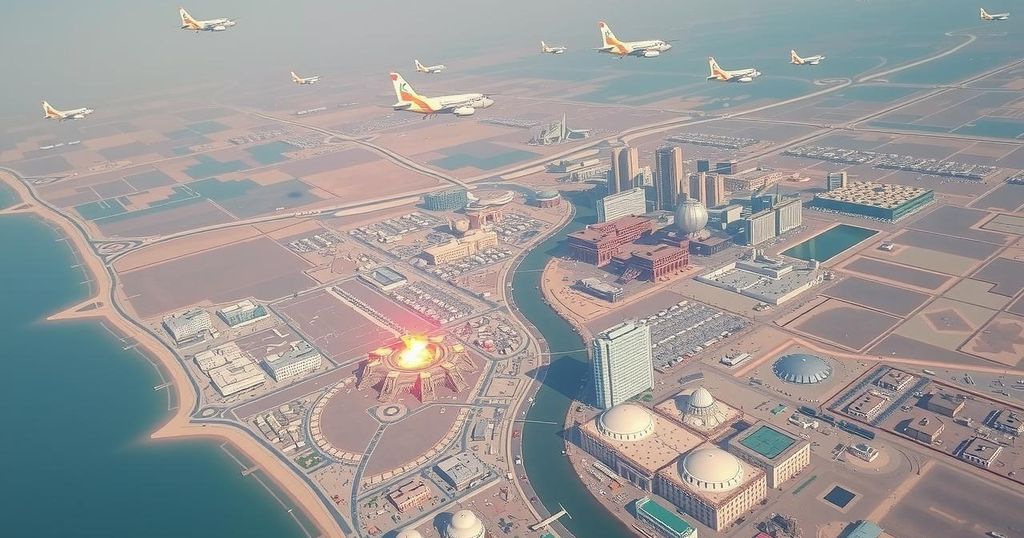Global news
AFP, AFRICA, ASIA, CEASEFIRE NEGOTIATIONS, CONFLICT, DAVID MENCER, DONALD TRUMP, EGYPT, GAZA, GAZA STRIP, HAMAS, HEZBOLLAH, HOSTAGE NEGOTIATIONS, HUMANITARIAN CRISIS, ISRAEL, JERUSALEM, MILITARY OPERATIONS, NETZARIM, NORTH AMERICA, PHILADELPHI, PHILADELPHI CORRIDOR, QATAR, RAFAH, SANAA, UNITED STATES, US, WASHINGTON, YA, YAHYA SINWAR, YEMEN
Leila Ramsay
0 Comments
Hope for Gaza Ceasefire as Israel and Hamas Engage in Renewed Talks
Recent negotiations between Israel and Hamas for a ceasefire and hostage release have shown promise, influenced by international mediation. A proposed deal includes a phased release of hostages in exchange for Palestinian prisoners and a gradual withdrawal of Israeli forces. However, key issues remain unresolved, particularly regarding governance in post-war Gaza.
Efforts to establish a ceasefire and hostages release agreement between Israel and Hamas have faced multiple obstacles since last year’s conflict erupted after the October 7 attack. However, recent negotiations have revived hopes of an imminent resolution, with involvement from the United States, Qatar, and Egypt. Diplomatic sources indicated that these discussions were influenced by US President-elect Donald Trump’s call for an agreement by January 20, coinciding with his return to office.
Hamas, facing increased isolation and heightened urgency, appears eager to finalize a deal, with some treating it as a timely resolution before the year’s end. Following the death of Hamas chief Yahya Sinwar, more pragmatic leaders within the organization have taken the lead in talks. Current discussions are reportedly at the final details stage, with announcements expected from the mediating countries once concluded.
The outline of the potential deal involves a ceasefire and a gradual release of hostages across three phases. In the initial phase, female soldiers and Israeli civilian hostages would be exchanged for hundreds of Palestinian prisoners, alongside a partial withdrawal of Israeli forces from the Rafah crossing area and various regions around Gaza. The subsequent phases would see further exchanges and the eventual declaration of an end to hostilities, initiating reconstruction efforts in war-torn areas.
Despite the progress in negotiations, some contentious issues remain unresolved, primarily surrounding the governance of Gaza and Israel’s military presence post-agreement. Israeli officials have repeatedly emphasized their stance against allowing Hamas to govern the territory anew. Furthermore, the management of the Rafah crossing—which involves multiple international stakeholders—continues to be debated.
The ongoing conflict between Israel and Hamas has intensified since the attack on October 7, 2023, which led to significant hostilities and the capture of hostages. Previous negotiations between these parties have been hindered by disagreements over lasting ceasefires and the terms for hostages’ release. The geopolitical landscape has been further complicated by the roles of Israel’s allies, as well as the internal dynamics within Hamas following leadership changes. The recent diplomatic efforts, particularly involving the United States, Qatar, and Egypt, reflect a renewed push towards finding common ground for peace negotiations amid pressing humanitarian concerns.
In conclusion, the recent talks for a possible ceasefire and hostage release agreement between Israel and Hamas have garnered cautious optimism amid ongoing challenges. The influential roles of international mediators like the United States, Qatar, and Egypt highlight the complexities of these negotiations. While significant strides have been made towards a potential agreement, several critical issues, particularly regarding governance in post-war Gaza and Israel’s military position, remain contentious and unresolved. The outcome of these discussions could have profound implications for both Israeli and Palestinian futures, and an enduring peace remains contingent upon finding equitable solutions to these enduring disparities.
Original Source: www.arabnews.com




Post Comment